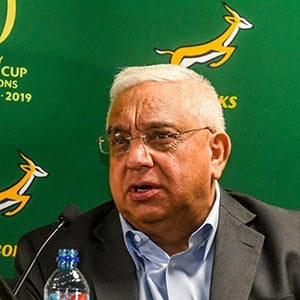
Mark Alexander: Keeping RWC stars in SA was a big positive
by Sibusiso Mjikeliso - Sport24SA Rugby president Mark Alexander drew massive positives from the retention of Rugby World Cup-winning Springboks Pieter-Steph du Toit and Makazole Mapimpi, who turned down big-money overseas moves despite 43% industry pay cuts.
Register your interest for the British & Irish Lions tickets in South Africa 2021
Rugby was thrown into a transfer deadline day frenzy two weeks ago as the 21-day opt out period for South African-based players to take up alternative contracts came to a thrilling crescendo on 14 May.
The hive of activity centred around World Rugby player-of-the-year Du Toit, who ended up somehow remaining at the Stormers after initially opting out of his contract on deadline day.
The wolves were out for the talismanic Springbok loose-forward as well as Sharks winger Mapimpi, who received a mouth-watering offer from Japanese club NTT Docomo Red Hurricanes. To Alexander's relief, both opted to stay in the country, at least for now.
"It's a very positive thing," said Alexander.
"I think we will see more players coming back. This Covid-19 pandemic has caused a lot of ripples throughout the world.
"I think you will see lots more players coming back to play here at home. It's started already with some key players coming back and playing for the Bulls.
Recent reports have also suggested that hooker Malcolm Marx, who opted out of his Lions contract, may return to the Johannesburg-based franchise, which would only serve to please the mother body even more.
SA Rugby instituted an Industry Strategic Plan, which was its way of mitigating an estimated R1 billion loss should rugby not return for the rest of the year. What it inadvertently created were loopholes that allowed players to move between domestic teams, with the parent union or franchise prohibited from making counter offers.
Although a number of promising players such as Tyrone Green, Tyler Paul and Jean-Luc du Plessis were snapped up by overseas clubs, the Springboks, by and large, avoided carnage.
"I understand that a rugby player has a short career span - it could be two or 15 years," said Alexander.
"They have to make the maximum amount of money in the shortest possible period. From that point of view, I understand it.
"From a selfish point of view, I'd like to keep all the players inside the country. But you have to look at this from an economics point of view."
Next year's British and Irish Lions series might have been a major factor in the likes of Mapimpi, Du Toit, Lukhanyo Am and Thomas du Toit remaining in South Africa.
Alexander was banking on the magic of the British and Irish Lions Tests to convince government to allow rugby's return to the field.
Although outdoor exercise (not in groups) would be permissible any time of the day during Level 3 of the current lockdown, sporting activity was still barred, President Cyril Ramaphosa announced on Sunday.
"We've submitted our presentation to government [addressing] the necessary protocols, so we have to wait for government’s response on it," Alexander said.
"I think government understands that it's important for us to get back onto the field. Sports is a major contributor to tourism in this country. Once this pandemic is under control, there will be nothing better to kick-start sports tourism in South Africa than the British and Irish Lions series.
"They understand the economics of how sports work in the country. We have confidence in the [sports] ministry and the government to do the right thing and make sure we are back on the field."